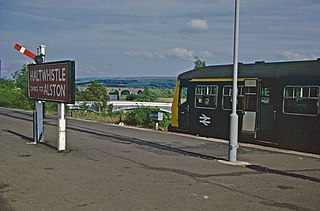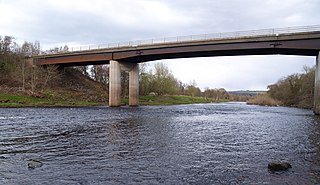
The South Tynedale Railway is a preserved, 2 ft narrow gauge heritage railway in Northern England and at 875ft is England's second highest narrow gauge railway after the Lynton and Barnstaple Railway in north Devon. The South Tynedale line runs from Alston in Cumbria, down the South Tyne Valley, via Gilderdale, Kirkhaugh and Lintley, then across the South Tyne, Gilderdale and Whitley Viaducts to Slaggyford in Northumberland.

The A69 is a major northern trunk road in England, running east–west across the Pennines, through the counties of Tyne and Wear, Northumberland and Cumbria. Originally, the road started in the centre of Newcastle upon Tyne then later near Birtley, but since the creation of the A1 Western Bypass around Newcastle upon Tyne, it now starts at Denton Burn, a suburb of Newcastle upon Tyne.

Haltwhistle is a market town and civil parish in Northumberland, England, ten miles east of Brampton. It had a population of 3,811 at the 2011 Census.

The A419 road is a primary route between Chiseldon near Swindon at junction 15 of the M4 with the A346 road, and Whitminster in Gloucestershire, England near the M5 motorway. The A419 is managed and maintained by a private company, Road Management Group, on behalf of the UK Department for Transport.

Haydon Bridge is a village in Northumberland, England, which had a population of 2,184 in the 2011 census. Its most distinctive features are the two bridges crossing the River South Tyne: the picturesque original bridge for which the village was named and a modern bridge which used to carry the A69 road. A bypass was completed in 2009 and the A69 now bypasses the village to the south.

Haltwhistle is a railway station on the Tyne Valley Line, which runs between Newcastle and Carlisle via Hexham. The station, situated 22 miles 66 chains east of Carlisle, serves the market town of Haltwhistle in Northumberland, England. It is owned by Network Rail and managed by Northern Trains.

Greenhead is a village in Northumberland, England. The village is on the Military Road (B6318), about 17 miles (27 km) from Chollerford, 3 miles (5 km) from Haltwhistle and 9 miles (14 km) from Brampton, Cumbria along the A69 road. The A69 bypasses the village, but until the 1980s all vehicular traffic passed through it. The village lies just outside the Northumberland National Park, close to Hadrian's Wall. Just to the north of the village is the 12th-century Thirlwall Castle, recently restored and opened to the public. Nearby villages include Upper Denton and Haltwhistle.

The Alston Line was a 13-mile (21 km) single-track branch line, which linked Haltwhistle in Northumberland with Alston in Cumbria.

The Haltwhistle Burn is a river which lies to the east of the Northumbrian town of Haltwhistle. Rising in the peaty uplands below the ridge of the Whin Sill, the burn passes through the Roman Military Zone south of Hadrian's Wall and through a dramatic sandstone gorge before descending between wooded banks to the South Tyne Valley. The Haltwhistle Burn drains an area of approximately 42 km2. Today the Burn is a haven for wildlife and a popular walk for residents and tourists but from Roman times until the 1930s the combination of valuable minerals and water power attracted a succession of industries which provided goods and employment to the town.

Lambley, formerly known as Harper Town, is a village and former civil parish, now in the parish of Coanwood, in Northumberland, England about four miles southwest of Haltwhistle. The village lies adjacent to the River South Tyne. In 1951 the parish had a population of 298. The place name Lambley refers to the "pasture of lambs". Lambley used to be the site of a small convent of Benedictine Nuns, founded by Adam de Tindale and Heloise, his wife, in the 12th century. The Scots led by William Wallace devastated it in 1296 [Rowland gives 1297]. However it was restored and one William Tynedale was ordained priest to the nunnery in about 1508 – most likely not William Tyndale, the reformer, as once believed but another man of the same name. At the time of the suppression of religious houses by Henry VIII, the nunnery contained six inmates. Nothing now remains but the bell from the nunnery, which hangs in the church, and a few carved stones. The village lies in the Midgeholme Coalfield and there are reserves of good-quality coal remaining.
Plenmeller is a village and former civil parish, now in the parish of Plenmeller with Whitfield, in Northumberland, England about a mile (1½ km) southeast of Haltwhistle. In 1951 the parish had a population of 107.

Constantius Bridge is a modern concrete bridge across the River Tyne about 1 mile (2 km) north west of Hexham, Northumberland, England. The bridge carries the A69 road over the River Tyne and forms part of the Hexham bypass. It is the last crossing of the River Tyne before it splits into the North Tyne and South Tyne.

The Tyne Valley Line is a 58-mile (93 km) route, linking Newcastle upon Tyne with Hexham and Carlisle, England. The line follows the course of the River Tyne through Tyne and Wear and Northumberland. Five stations and two viaducts on the route are listed structures.

Styford Bridge is a modern concrete bridge carrying the A68 road across the River Tyne east of Riding Mill, Northumberland, England and forms part of the A68 bypass of Corbridge.
Haydon Bridge Viaduct carries the A69 Haydon Bridge bypass across both the Newcastle upon Tyne to Carlisle railway and the River South Tyne, about 1⁄2 mile (0.8 km) west of Haydon Bridge.

Haltwhistle A69 Bridge, East is a concrete bridge across the River South Tyne at Haltwhistle in Northumberland, England.

Alston Arches Viaduct, also known as Haltwhistle Viaduct, is a stone bridge across the River South Tyne at Haltwhistle in Northumberland, England.

The Blue Bridge is an iron bridge across the River South Tyne at Haltwhistle in Northumberland, England.

Bellister Bridge is a concrete bridge across the River South Tyne at Haltwhistle in Northumberland, England.

The Byker Viaduct is a 2,674 ft (815 m) curved 'S' shaped light railway bridge, which carries the Tyne and Wear Metro over the River Ouseburn in Newcastle upon Tyne. It carries the line from Manors Metro station in the city centre to the west, to Byker Metro station in the area of Byker to the east, over the lower Ouseburn valley, with the river emptying into the north side of the River Tyne, to the south.



















